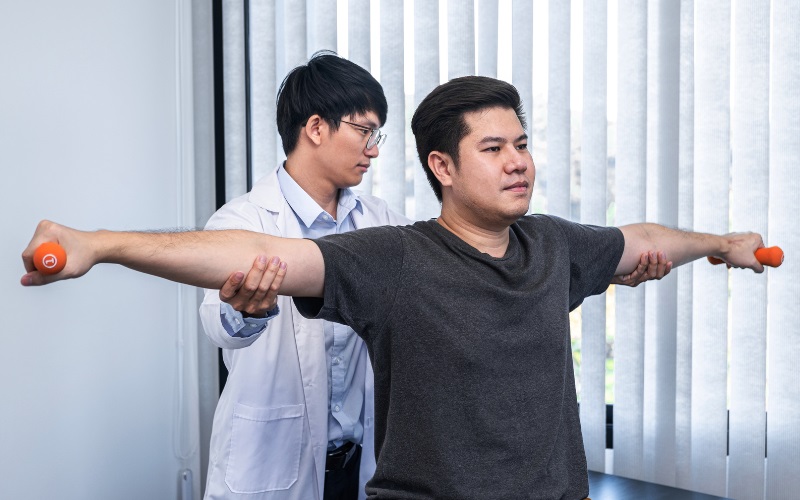Sports physiotherapy plays a crucial role in enhancing athletic performance and facilitating recovery from injuries. However, there are several myths and misconceptions surrounding this specialised field of physiotherapy. Let’s debunk these misconceptions to provide clarity and accurate information.
Myth 1: Sports Physiotherapy is Only for Professional Athletes
One prevalent misconception is that sports physiotherapy is exclusively for elite athletes. In reality, sports physiotherapy is beneficial for individuals of all ages and activity levels, from recreational enthusiasts to weekend warriors. Whether you’re recovering from a sports injury or seeking to prevent one, a rehab centre in Singapore specialising in sports physiotherapy can tailor treatments to meet your specific needs.
Myth 2: Rest is Always the Best Treatment for Sports Injuries
Contrary to popular belief, complete rest isn’t always the optimal treatment for sports injuries. While initial rest may be necessary to prevent further damage, sports physiotherapy focuses on active rehabilitation. This includes targeted exercises and therapies designed to restore mobility, strength, and function. Physiotherapy near you can provide personalised care plans that promote faster recovery and reduce the risk of recurring injuries.
Myth 3: Sports Physiotherapy Requires a Doctor’s Referral
Another misconception is that you need a doctor’s referral to see a sports physiotherapist. Many rehab centres in Singapore offer direct access to physiotherapy services, allowing individuals to seek treatment without a referral. This direct access enables timely intervention and personalised care, ensuring that athletes and active individuals can start their recovery journey promptly.
Myth 4: Sports Physiotherapy Is Painful and Uncomfortable
There’s a common fear that sports physiotherapy involves painful treatments. However, modern sports physiotherapy techniques prioritise patient comfort and effectiveness. Therapists utilise a variety of methods, including manual therapy, therapeutic exercises, and advanced modalities like ultrasound and electrical stimulation. These treatments are tailored to manage pain, promote healing, and restore optimal function without unnecessary discomfort.
Myth 5: Sports Physiotherapy Only Focuses on Physical Healing
Sports physiotherapy encompasses more than just physical healing. It adopts a holistic approach that addresses the mental and emotional aspects of recovery. Rehab centres in Singapore integrate strategies for stress management, mental resilience, and nutritional guidance alongside physical therapies. This comprehensive care enhances overall well-being and supports athletes in achieving peak performance.
Myth 6: You Can’t Benefit from Sports Physiotherapy If You’re Not Injured
While sports physiotherapy is crucial for injury recovery, it also plays a preventive role. Physiotherapists assess movement patterns, identify biomechanical issues, and provide corrective exercises to reduce the risk of future injuries. Whether you’re preparing for a competition or simply staying active, sports physiotherapy can optimise your physical conditioning and performance potential.
Myth 7: Sports Physiotherapy Is Expensive and Time-Consuming
Some individuals avoid sports physiotherapy due to perceived costs and time commitments. However, the investment in physiotherapy can lead to long-term savings by preventing chronic injuries and reducing reliance on medications or surgical interventions. Many rehab centres offer flexible scheduling options and accept various insurance plans, making quality physiotherapy accessible and affordable.
Myth 8: Anyone Can Perform Sports Physiotherapy Exercises Without Professional Guidance
While basic exercises may seem straightforward, effective sports physiotherapy requires expert guidance. Physiotherapists undergo extensive training to assess injuries, prescribe appropriate exercises, and monitor progress. Incorrect exercise techniques or overexertion can exacerbate injuries or delay recovery. Seeking guidance from a qualified physiotherapist ensures safe and effective rehabilitation tailored to your specific condition and goals.
In conclusion, debunking these myths about sports physiotherapy reveals its broad applicability, effectiveness, and benefits beyond traditional misconceptions. Whether you’re aiming to recover from an injury, enhance performance, or prevent future setbacks, consulting a rehab centre in Singapore specialising in sports physiotherapy can be pivotal in achieving your health and fitness goals.
Contact ProRehab today to debunk these myths and discover personalised physiotherapy solutions that support your health and fitness goals effectively.

